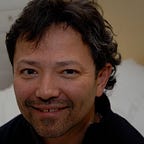An Ethic that Affirms Life
An introduction to Deleuzian ethics
My eyes already touch the sunny hill,
going far ahead of the road I have begun.
So we are grasped by what we cannot grasp;
it has its inner light, even from a distance —
and changes us, even if we do not reach it,
into something else, which, hardly sensing it,
we already are; a gesture waves us on,
answering our own wave…
but what we feel is the wind in our faces.
— Rainer Maria Rilke, A Walk
We have seen that, for Gilles Deleuze, ontology is epistemology and vice versa. Questions regarding the nature of reality and our experience of reality are only separate questions when divided by a transcendent subject that stands over reality, completing it.
A subject created in difference in the immanent field, that constructs reality in thought, knows no split between reality and thought. Such a subject’s thoughts, thoughts freed from a dogmatic image, creative thoughts, participate in a reality that is becoming.
Why Philosophy?
Now coming into view is the sense that:
ontology = epistemology = ethics
The central aim of all of Deleuze’s philosophy is ethics, as he will interpret that term, and the question of how one might live.
Put another way:
reality = experience = life
To take the stance that reality is difference-in-itself, repetition-for-itself, that pure thought is boundless creativity, unhindered experimentation, is one and the same as taking the stance that life itself is pure difference, pure creativity.
To live a fulfilling life is to embrace pure difference and pure creativity.
The melodic lines in a Deleuzian symphony of difference come together when viewed through the lens of an ethics of becoming.
When our thoughts of how to live a good life reflect our thoughts on reality and experience, then ontology, epistemology and ethics together form a vision that expresses immanence, pure difference, pure repetition, and affirms the eternal return.
While I have, for the purpose of explication, approached Deleuze’s philosophy in terms of the separate branches of philosophy, we will see that Deleuze does not view the practice of philosophy in this manner. For Deleuze, they are one, and all paths lead to ethics:
Philosophy is practical, or it is of no use at all.
A theory of reality and our experience of reality framed in difference can only be relevant if it culminates in an ethics of difference. And our ethics must reflect this reality of difference, or it will not be useful or remarkable.
Deleuze has a broad view of what it means to do ethics, one that differs from traditional philosophical approaches, and one that knows no boundaries.
Ethics is at once personal and social, social and political.
Deleuzian ethics approaches the personal, social and political as a continuum in a perpetual state of flux in which becomings arise on a plane of immanence.
His approach will have dramatic implications from the perspective of personally living fulfillment, and going to the limit of one what one might become.
I hope you enjoyed this article. Thanks for reading!
Tomas
Please join my email list here or email me at tomas@tomasbyrne.com.
Excerpt from my forthcoming book, Becoming: A Life of Pure Difference (Gilles Deleuze and the Philosophy of the New) Copyright © 2021 by Tomas Byrne. Learn more here.
